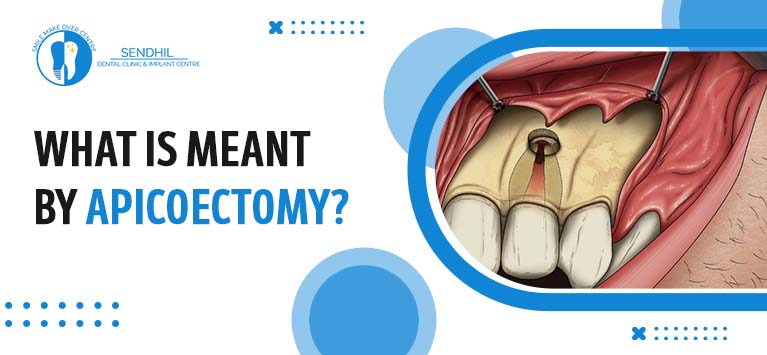
What is meant by Apicoectomy?
Pulp Cavity – The soft, central layer of a tooth consists of two main parts: Pulp chamber and Root Canal. The pulp is a non-calcified tissue and is responsible for a tooth’s nourishment as that nerves, blood vessels, and connective tissues are located in this region. The tissues and nerves are running towards the root canal that is located within the tooth roots.
When a tissue in the pulp cavity gets infected, you will need a mini surgical procedure called Root Canal Therapy (RCT) to eliminate the infection. Despite having long-lasting success rates, infections can develop in a root canal-treated tooth at times.
In such circumstances, dentists will perform a non-surgical procedure called Apicoectomy.
What is Apicoectomy?
Apicoectomy also known as Root End Surgery involves removing the tooth’s root tip and the infected tissues around it. Now the root canal is filled and sealed with a biocompatible material.
As it is a microsurgical procedure, it is more invasive than a conventional Root Canal Procedure.
Why is Apicoectomy necessary?
Root canal procedure is needed when the innermost layers of a tooth are infected or inflamed. When the treated tooth is re-infected due to problems in healing or other issues, the diseased tissues have to be eliminated. Otherwise, the tooth cannot be saved.
Hence dentists tend to perform root canal therapy again.
RCT operations are typically repeated 2 to 3 times, depending on the severity of the infection and the number of root canals present in a tooth. For those who don’t want to undergo recurrent root canal treatments, apicoectomy will be the right choice.
Aside from removing the infected nerves inside a tooth, the root end surgery is also required in various circumstances as follows:
- Treat fractures inside a tooth
- Clean calcium deposits from the root canal
- Remove the extra roots of a tooth
How do dentists perform Apicoectomy?
Dentists confirm whether a root canal-treated tooth is infected with radiograph images like X-rays through which the affected region is also identified. Meanwhile, dentists take a look at the patient’s medical history, and medications are taken.
Dentists then give the patient antibacterial mouth rinses to lessen inflammation as they get them ready for Apicoectomy. The steps taken during this procedure are as follows:
Step 1: Similar to RCT, it is also performed under anesthesia. It implies that Apicoectomy begins by numbing the area around the diseased spot using a local anesthetic agent.
Step 2: An incision is made in the gum around the affected tooth to access the tooth’s root region and tissues around it.
Step 3: The root’s tip and its surrounding tissues are removed.
Step 4: A biocompatible substance is used to seal the root canal’s ending portion. Now sutures are made to close the gum incision.
As time passes by, the jaw bone heals the surgical wounds in the root portion.
Is it painful?
As mentioned earlier, it is quite invasive but you will not sense any pain as numbing agents are used during the procedure. However, you might sense mild discomfort once the anesthetic agents wear away.
Don’t worry. It is common and subsides in a few days or weeks but you should strictly abide by the aftercare instructions prescribed by your dentist. Here are some instances:
- Apply ice packs over the treated region
- Avoid smoking
- Avoid alcohol consumption
- Maintain a soft or liquid diet
- Take Over-the-Counter medications and painkillers as prescribed
Bottom line
Apicoectomy is a minimally invasive surgical procedure that can safeguard a deeply infected tooth from extraction by removing the tooth’s root tip and diseased nerves inside. It is typically recommended when the endodontically treated teeth are infected again.
If you had received RCT for a tooth and sense sharp pain in the teeth or notice pimple-like bumps on the gums around it, swelling in gums around the treated tooth, call your dentist immediately. They indicate the tooth might be infected again and you might need another RCT or Apicoectomy.



